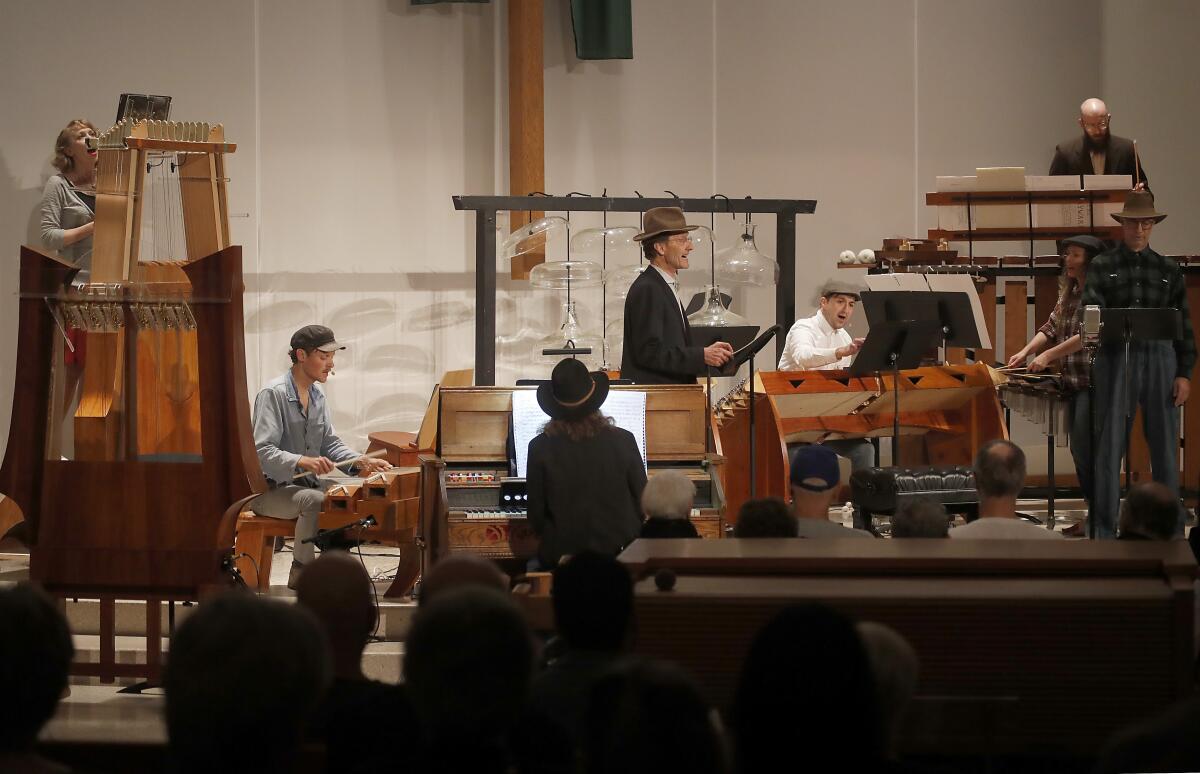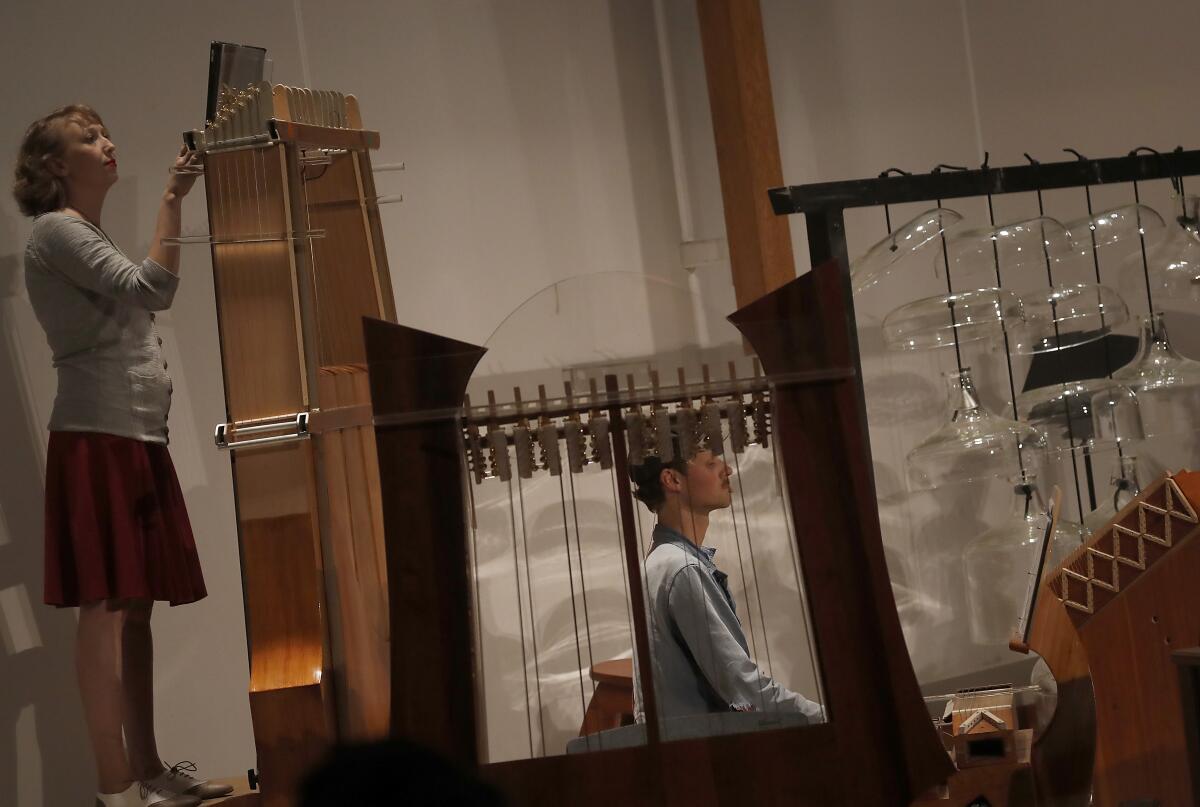Review: Harry Partch, the hobo years

- Share via
In a time of terrible homelessness, can we speak of hobo culture and not romanticize the wealthiest cities in our wealthy state that are proving incapable of taking care of our own?
But not to speak of hobo culture entails a different kind of irresponsibility. That was the revelation of Harry Partch’s Great Depression-era hobo epic, “The Wayward,” finally given its first complete performance Saturday night at First Presbyterian Church of Santa Monica as part of the new music series Jacaranda.
Before getting into Partch and this chronicle of his years riding the rails and living on the streets in Southern California in the late 1930s, a word about where we stand today with skid row in downtown Los Angeles. In a talk preceding the concert, John Schneider, whose Partch Ensemble mounted “The Wayward,” and John Malpede, who founded the Los Angeles Poverty Department, delved into the longstanding and far-too-little-recognized relationship between the arts and homelessness.
Many skid row arts projects give voice to the homeless, cement community and help people get off the street. The Midnight Mission’s overpoweringly stirring annual Street Symphony “Messiah,” for instance, will next month again be an occasion to take stock of our community’s failure and potential.

“The Wayward” tells a different story. The world’s economy was in decline. Widespread deprivation was the norm. There was more of a sense that we were all in this together. And hobos formed actual, if fragile, communities. Artists rode the rails as part of their art, and many, Partch included, got aid from the federal Works Progress Administration.
Another difference was that hobo life had a whiff of freedom to it. Partch, who died in 1974, was an ornery cuss of a composer if ever there was one. Many at the concert Saturday remembered him when he lived on West Washington, now Abbot Kinney, in Venice — at a time when a composer with little money could afford what is now some of the most expensive real estate in town.
On one level, this is about as authentic a picture of hobo life as any. Partch’s text comes from hitchhiker inscriptions on a railing in Barstow, a hobo letter and the composer’s own freight-car musings (“You exclamation mark bum! Get your semicolon asterisk out o’these yards”). But Partch’s hobo years — on and off, from 1936 to 1943 — were as much about footloose artistic anti-establishmentarianism as poverty. He rode rails as a way to rail against institutions and music as it was practiced.
On the road, he somehow began building his special instruments, tuned to 43 notes per octave, instead of the 12 used in Western scales. He applied studies in acoustics, Greek philosophy and ancient Chinese culture toward a new kind of music.
“The Wayward” originally consisted of four separate pieces: “Barstow,” “San Francisco” (setting the cries of newsboys), “The Letter” (from a hobo friend) and “U.S. Highball” (an account of a transcontinental hobo trip). All were composed between 1941 and 1943, later revised. In 1955, Partch wrote an instrumental piece, “Ulysses at the Edge of the World,” the Homeric Greek king’s wanderings seen as their own kind of hobo trip. Partch later decided to add this as an epilogue to “The Wayward,” but he never performed all five sections together. Saturday was the first time the full 55-minute opus was heard.
For Partch, the L.A. ensemble that has for the last two decades been laboriously building a Partch instrument every year, “The Wayward” is a milestone that needed a tall, eccentric harp with strings on front and the sides in clusters that allow for curiously tuned chords. The kithara II is the latest in the ensemble’s collection. It is a beautiful instrument, played by Alison Bjorkedal, who, like all members of the ensemble, is a stellar performer in the local new music community.
The composer’s own gravelly voice recordings of “The Wayward” exhibit a quirky combination of rebellious insouciance and defiant anger. The ensemble put a priority on lovable insouciance and, at times, outright humor. The players wore lively hobo outfits, played cards and thumbed noses when not otherwise occupied by the demanding instruments. They took turns intoning the texts, with Schneider as the main Woody Guthrie-esque hitchhiking composer. Mainly, though, they played gloriously.
I don’t know that anyone ever could get used to the sounds that Partch’s music makes. The cloud chamber bowls ring like the tuned glass they are. The altered viola goes where no viola has ever dared. The bass marimba aims at a listener’s solar plexus.
The rest of the program included a lesser known short piece from 1943, “Dark Brother,” a Whitman-esque song of loneliness, sung by percussionist T.J. Troy, sounding very like Partch. A decade later, Partch, more optimistic, turned to the mythological twins, Castor and Pollux. His 1953 dance score, which ended the program, had further contemporary context, given that Esa-Pekka Salonen was inspired by the same twins in his latest piece, “Gemini,” given its premiere by the Los Angeles Philharmonic two weeks earlier.
But unlike Salonen’s moody Pollux and frenzied Castor, Partch applied the pleasure principle. Each twin is represented through short dances of insemination, conception, incubation and delivery. Ancient Greece is born again through rhythmic uplift and the imagining of a past that bypasses ills of the modern world.
If there is message to the contagious ebullience of Partch, an ensemble that keeps getting better and better (and is making essential recordings, “Ulysses” on the latest), it might be that homelessness is the problem, not the homeless. And that Partch need not be one, either, however challenging it is to make and learn to play the instruments as well as figure out the scores.
More to Read
The biggest entertainment stories
Get our big stories about Hollywood, film, television, music, arts, culture and more right in your inbox as soon as they publish.
You may occasionally receive promotional content from the Los Angeles Times.











